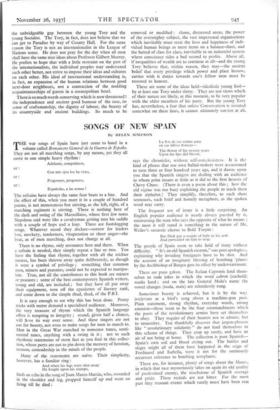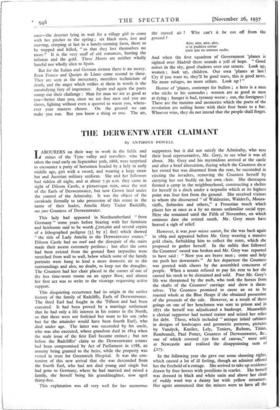SONGS OF NEW SPAIN
By HELEN SIMPSON
THE war songs of Spain have just come to hand in a volume called Romancero General de la Guerra de Espana. They are not all marching songs, by any means, yet they all move to one simple heavy rhythm :
Adelante, compafieros, Con mis ojos los he visto, Pregonero, pregonero, Espatioles, a las arenas !
The refrains have always the same four beats to a line. And the effect of this, when you meet it in a couple of hundred poems, is not monotonous but stirring, as the left, right, of a marching regiment is stirring. There is nothing here of the dash and swing of the Marseillaise, whose first few notes Napoleon said were like a cavalryman getting into his saddle with a couple of hops and a leap. These are footslogging songs. Whatever mood they declare—sorrow for leaders lost, mockery, tenderness, vituperation or sheer anger—the beat, as of men marching, does not change at all.
There is no rhyme, only assonance here and there. When a refrain is needed, they simply repeat a line or two. You have the feeling that rhyme, together with all the trickier metres, has been thrown away quite deliberately, as though it were a symbol of privilege ; something that common men, miners and peasants, could not be expected to manipu- late. True, not all the contributors to this book are miners or peasants ; some of the best contemporary Spanish writers, young and old, are included ; but they have all put away their equipment, torn off the epaulettes of literary rank, and come down to the simple thud, thud, of the P.B.I.
It is easy enough to see why this has been done. Pretty tricks with metre demand a specialised audience. Moreover, the very treasure of rhyme which the Spanish language offers is tempting to integrity ; sound, given half t chance, will hive its way over sense. And these singers are not out for beauty, not even to make songs for men to march to. Men in the Great War marched to nonsense tunes, senti- mental tunes, anything with a swing in it ; not to such rhythmic statements of stern fact as you find in this collec- tion, whose poets are out to pin down the memory of heroism, treason, comradeship in the minds of the people.
Many of the statements are naive. Their simplicity, however, has a familiar ring :
And when his legs were shot away He fought upon his stumps,
finds an echo in the song of Juan Marco Martin, who, wounded in the shoulder and leg, propped himself up and went on firing till he died :
La flor de sus veinte anos en sus labios florecia- The flower of his twenty years Upon his lips did bloom,
says the chronicler, without self-consciousness. It is the kind of phrase that our own ballad-makers were accustomed to turn three or four hundred years ago, and it dawns upon you that the Spanish singers are dealing with an audience to whom print means as little as it did to the first hearers of Chevy Chase. (There is even a poem about this ; how the old regime was too busy exploiting the people to teach them their alphabet.) They simplify, therefore, to such short sentences, such brief and homely metaphors, as the spoken word may carry.
The frequent use of irony is a little surprising. An English popular audience is nearly always puzzled by it, mistrusting the man who says the opposite of what he means ; the most it will stand is something in the nature of Mr. Weller's sarcastic chorus to Bold Turpin :
But Dick put a couple of balls in his nob And perwailed on him to stop.
The people of Spain seem to take hold of irony without difficulty. " It's an old Spanish custom," one poet apologises, explaining why invading foreigners have to be shot. And the account of an imaginary blessing of bombing 'planes by the Archbishop of Burgos gets its effect by understatement.
There are puns galore. The Italian Capronis lend them- selves to rude jokes in which the word cabron (cuckold) works hard ; and on the late General Mola's name the vowel changes (mula, mala) are relentlessly rung.
Sometimes beauty is achieved, but it is by the way, irrelevant as a bird's song above a machine-gun post. Plain statement, strong rhythm, everyday words, strong emotion—these seem to be the four commandments which the poets of the revolutionary armies have set themselves to obey. They require of their hearers not to admire, but to remember. You thankfully discover that jargon-phrases like " revolutionary solidarity " do not lend themselves to this scheme of things. They crop up rarely, and have an air of not being at home. The collection is pure Spanish— Spain's own soil and blood crying out. The battles and sieges might all of them have happened in the feign of Ferdinand and Isabella, were it not for the ominously recurrent reference to bombing aeroplanes.
There are, for instance, plenty of songs about the Moors, in which that race mysteriously takes on again its old quality of predestined enemy, the touchstone of Spanish courage and pride. These recitals are not bitter. For the most part they recount events which surely must have been real ones—the deserter lying in wait for a village girl to come with her pitcher to the spring ; six black men, lost and starving, creeping at last to a lonely-seeming farm, there to be trapped and killed, " so that they lost themselves no more." It is the very stuff of old romances, barring the infantas and the gold. These Moors are neither wholly hateful nor wholly alien to Spain.
But for the Italian and German airmen there is no mercy. Even Franco and Queipo de Llano come second to these. They are seen as the mercenary, merciless technicians of death, and the anger which strikes at them in words is the unsatisfying fury of impotence. Again and again the poets stamp out their challenge : Man for man we are as good as you—better than you, since we are free men and you are slaves, fighting without even a quarrel to warm you, where- ever your masters choose. On the ground we can make you run. But you know a thing or two. The air, the cursed air ! Why can't it be cut off from the ground ?
Aire, aire, aire, aire, si to pudiera cortar para que no entrase nadie.
And when the first squadron of Government 'planes is sighted over Madrid there sounds a yell of hope. " Good noises in the sky, good shadows over our streets. Look up, women ; look up, children. Our own 'planes at last ! Cry if you want to, they'll be good tears, this is good news. No more refuges, no more cellars. Look up ! "
Horror of 'planes, contempt for bullets ; a hero is a man who sticks to his comrades ; women are as good as men at dying ; hunger is bad, tyranny worse ; out, the foreigners ! These are the maxims and memories which the poets of the revolution are nailing home with their four beats to a bar. Whoever wins, they do not intend that the people shall forget.















































 Previous page
Previous page